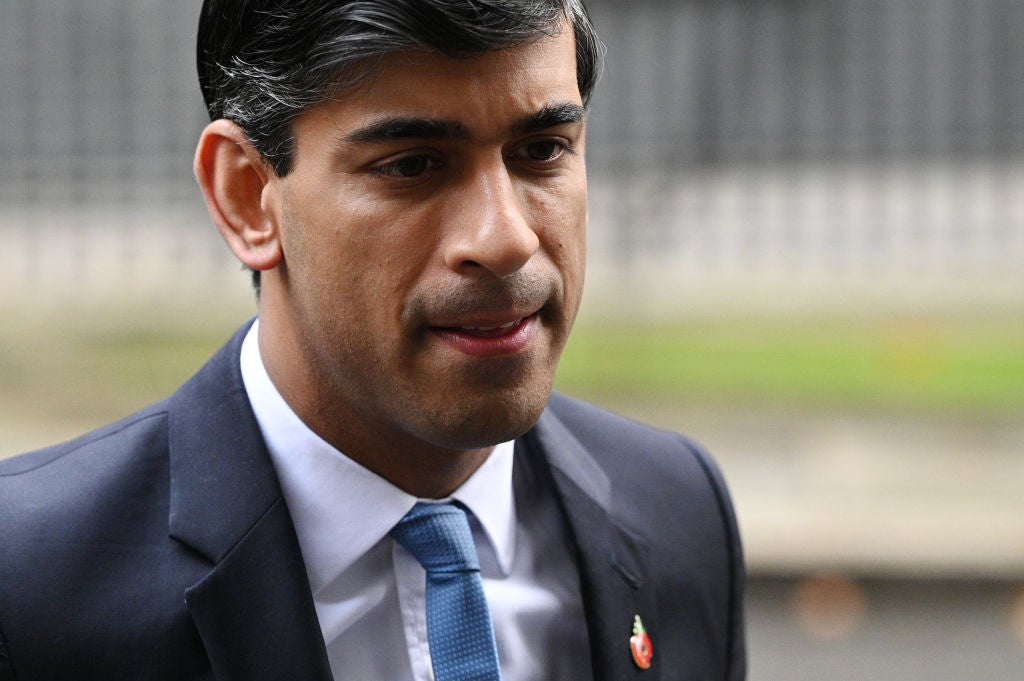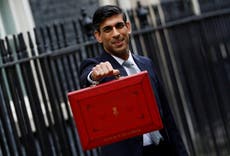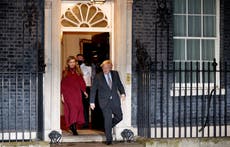My advice to Rishi Sunak ahead of the Budget
While the recovery is uncertain and interest rates low, it would be foolish to rush the process of deficit reduction


Your support helps us to tell the story
From reproductive rights to climate change to Big Tech, The Independent is on the ground when the story is developing. Whether it's investigating the financials of Elon Musk's pro-Trump PAC or producing our latest documentary, 'The A Word', which shines a light on the American women fighting for reproductive rights, we know how important it is to parse out the facts from the messaging.
At such a critical moment in US history, we need reporters on the ground. Your donation allows us to keep sending journalists to speak to both sides of the story.
The Independent is trusted by Americans across the entire political spectrum. And unlike many other quality news outlets, we choose not to lock Americans out of our reporting and analysis with paywalls. We believe quality journalism should be available to everyone, paid for by those who can afford it.
Your support makes all the difference.Tomorrow’s Budget will owe a lot to a fifth-century north African saint who is reported to have asked the Almighty: “God, make me good, but not just yet.”
The chancellor says he wants to “level with the British people”. In words, maybe. But in deeds, not just yet. Instead, he will try to ensure that there is post-Covid economic recovery by continuing to “do what it takes” to support loss-making businesses and jobs, and to stimulate consumer demand through the remaining months of an unwinding lockdown.
Rishi Sunak will do this by running a budget deficit in 2020-21 of around £350bn, close to 17 per cent of GDP, a level of deficit financing unheard of outside wartime and adding to the stock of public debt, already around 100 per cent of GDP.
Because an omniscient God is also economically literate, He (or She) will understand that these war-time levels of borrowing are necessary – for a while. But He (or She) will also need reassuring, through the high priests of public finance on the Conservative backbenches, that “good”, in the form of balanced budgets and debt reduction, will return.
To demonstrate good intentions, there will be some tax increases, not so searing as to choke off recovery but sufficient to demonstrate that the chancellor hasn’t become a high spending apostate. The tax increases will also need to signal that even such protected species as Conservative voters and donors will have to pay their share.
Since the pandemic has forced businesses to close, creating an estimated 2.5 million unemployed (7 per cent of the labour force) and perhaps more, it is right that companies and workers are compensated. as they have been through business loans and furlough payments.
But another key fact about the pandemic is that household savings, normally around 7 to 8 per cent of disposable household income, have surged to around 25 per cent. The public is very nervous about the future and, anyway, non-essential shops are shut. If the government did nothing more to offset the rise in private savings than merely lifting the lockdown restrictions, there is still a risk that it leaves a big hoard of savings and a shortage of spending, creating mass unemployment.
The Budget deficit represents the state spending vigorously where consumers and businesses have been unable to spend. It now has to be gradually reduced as households get back to spending normally.
One of the chancellor’s problems is that he doesn’t know how fast people will start splashing out: like a “coiled spring”, as Andy Haldane of the Bank of England predicts, or like a wet blanket if people are still frightened for their health or for their long-term financial position. Certainly, the spending limits for poor and indebted families could cancel out the coiled springs.
The recovery, when it happens, will generate more revenue from increased spending and economic activity. But perhaps not enough to return to budgetary balance, especially as some lucrative tax generators like the City of London have been damaged by Brexit. So, other taxes are needed in due course.
There are two quite different budget calculations, often confused in the public debate. The first is how quickly to get the “day-to-day” budget back into rough balance (excluding the £50 to £60bn of capital borrowing for investment, mainly in infrastructure, which almost everyone agrees is imperative).
The second is when and how much to “pay back” government debt that has been accumulated in the pandemic. In fact, there is no reason to worry about this legacy debt. There is almost complete unanimity among economic policymakers, including the IMF and the OECD, that there is absolutely no reason to start “paying back” at this stage. Get the economy back to healthy growth and full employment, so that further debt no longer needs to be incurred. Then start worrying about the legacy.
Astute readers will recognise that this is a very different argument from that advanced by the coalition government 10 years ago. Back then, debt was lower than today, but we were determined to get it down. There are several big differences between then and now, the most important being interest rates. Debt is more or less of a problem depending on how much it costs to service.
In May 2010, the interest rate on government debt (10 year bonds) was 3.7 per cent and there were also real worries that they could rise much higher if markets panicked, as they seemed likely to do, since Britain was exceptionally exposed to the banking crisis. Today, interest rates are close to zero (0.7 per cent) and Britain is, thanks to the vaccine roll-out, better positioned to recover quicker than most countries.
Still, the chancellor cannot ignore the level of public debt entirely, even though it is currently well under half the level Britain had emerging from the war or which Japan has today. Interest rates, and servicing costs, could rise in future. There was a shiver of fear about future inflation, and higher rates, in global bond markets last week: perhaps a premonition. Then, there is also the risk of some future disaster – a new pandemic; a financial crisis followed by recession – which could lead to another borrowing binge.
It is these anxieties that will be used to justify a premature and misdirected “Austerity Mark 2”, which is already well underway. The government has cut the aid budget – in my view wrongly – so that Britain is withdrawing support from Yemen as it faces one of the worst famines in modern times. At home, it is planning – also wrongly – to reverse the £20 supplement to universal credit, badly needed by poor families. And the government has frozen public sector pay, which could lead to a confrontation with teachers, nurses and police officers later in the year.
Tax rises are already in train, too. There are big increases in council tax planned to keep councils from bankruptcy and basic services from being slashed further. We undoubtedly need a property tax, not just for revenue but to help dampen the rampant and socially damaging escalation in property prices. However, council tax neither funds councils adequately nor taxes people fairly. It badly needs reform with higher bands and rates of tax that better reflect the value of property. Otherwise, it is just another tax on the less well off.
The chancellor has also trailed the idea of not raising income tax and NI thresholds: potentially undoing the good work of the Coalition in lifting the lowest earners out of tax.
Another tax rise baked in is the promised crackdown on freelancers through IR35. The aim is to widen the net of national insurance. Unfortunately, in order to catch a few serious tax dodgers, large numbers of self-employed contractors will be hit: people who have been among the biggest economic casualties of the pandemic.
So far, so bad. The chancellor should instead be imposing NI on better off, working, pensioners (like me) who have been shielded from economic sacrifices during 2020. It would be reassuring, too, if there was a move to equalise income and capital gains tax; if corporation tax were closer to the OECD average; if digital businesses were to be properly taxed; and if carbon emissions were taxed effectively. None of these should inhibit business recovery if the increases are moderate. And they would convey a serious commitment to a fairer tax system.
The obsession of Conservative backbenchers with tax cuts regardless of circumstances is economic nonsense. Labour’s sudden conversion to stopping all tax rises, while demanding more spending, is equally unconvincing and wrong.
While the recovery is uncertain and interest rates low, it would be foolish to rush the process of deficit reduction. And the legacy debt from the pandemic can be ignored for the time being.
But even St Augustine accepted that respite from uncomfortable truths is only temporary. In the end, decent services have to be funded by fair taxes.



Join our commenting forum
Join thought-provoking conversations, follow other Independent readers and see their replies
Comments